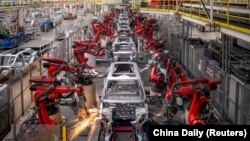In response to unfair trade practices by the People’s Republic of China, including state-supported overcapacity of goods that flood markets and wipe out competition, the United States has announced additional tariffs on a variety of products and industries targeted by the PRC for dominance.
National Security Advisor Jake Sullivan underscored why such measures are needed:
“China’s distorted practices, nonmarket economic practices, subsidizing at a dramatic scale industries where they are going to produce so much quantity of good and then flood the global market with it threatens to create global imbalances that are not stabilizing.”
The additional U.S. tariffs will be imposed on China’s critical manufacturing and mining sectors, including steel and aluminum, semiconductors, electric vehicles, batteries, solar cells, and certain critical minerals, said U.S. Trade Representative Katherine Tai.
“The increased tariffs are expected to cover approximately $18 billion of trade,” she said. “This strong action by the President is strategic. As he has said, we do not seek to constrain China’s economic development, but we will insist on fair competition and defend American workers from the PRC’s unfair practices.”
Ambassador Tai said the move by the United States should come as no surprise to the PRC. U.S. officials over the past three years have been clear about “the challenges that we are facing…and the need for us to act:”
“This is not about escalation. … The types of support that we’re talking about here are defensive in nature. They’re about creating the space to compete, the space to thrive, the space to survive the kind of onslaught that we are seeing across the board.”
During recent remarks in Frankfurt, Germany, U.S. Treasury Secretary Janet Yellen emphasized the global nature of the challenge posed by the PRC, and the need for coordinated action. “Industrial overcapacity not only poses a threat to firms in the U.S. and Europe,” she said. “It could also prevent countries around the world, including emerging markets, from building the industries that could power their growth. … If we do not respond strategically and in a united way, the viability of businesses in both our countries and around the world could be at risk.”






